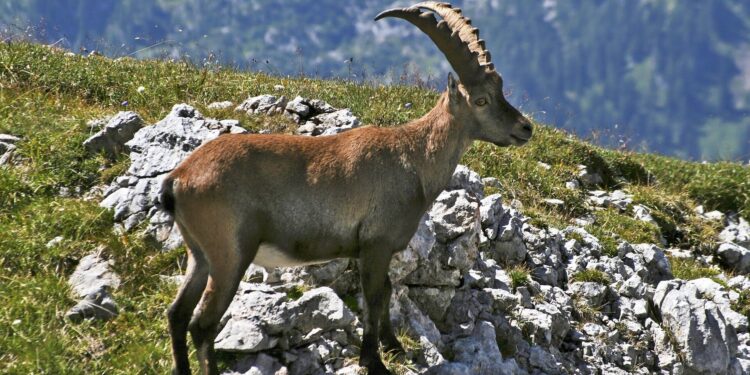Credit: Pixabay/CC0 Public domain
A team of biologists and veterinary scientists from the University of Sassari, Parc Naziunal Svizzer, Gran Paradiso National Park and the University of Ferrara report that Alpine ibexes have changed their grazing habits in recent years in response to rising temperatures. In their study, published in Proceedings of the Royal Society B,the group followed the behavior of Alpine ibexes living in part of the Alps during the years 2006 to 2019.
The Alpine ibex is a species of Alpine goat. They feed primarily on grass, and usually do so by moving lower in the mountains during the day to grassy areas so they can feed. In this new effort, the research team noted that temperatures in Gran Paradiso National Park in the Italian Alps were slowly rising amid global warming. This led them to wonder how the Alpine ibex that live in the park were reacting to these changes. To find out, they captured 47 goats in 2006 and attached motion-sensing collars to them to track their movements.
The team found that on warmer days, the ibexes became less active during the day and more active at night. They noted that this decision made sense, because trying to stay cool during hot days would use more energy than trying to stay warm during cool summer nights.
But it also had serious drawbacks. Ibex are much more likely to fall prey to wolves when grazing at night, because they are not as protected in grassy areas and cannot see wolves approaching. The researchers suggest that the shift to a more nocturnal lifestyle is not a viable behavioral change for the Alpine ibex over time due to wolf predation. As climate change progresses, ibexes risk becoming increasingly nocturnal, putting their survival at great risk.
The research team suggests that work like this demonstrates that some wildlife responses may be overlooked by models that attempt to predict environmental changes due to global warming due to subtle behavioral changes.
More information:
Francesca Brivio et al, In search of temporal refuges against thermal stress: increase in nocturnal activity despite the risk of predation, Proceedings of the Royal Society B: Biological Sciences (2024). DOI: 10.1098/rspb.2023.1587
© 2024 Science X Network
Quote: The Alpine ibex becomes more and more nocturnal as temperatures increase (February 2, 2024) retrieved February 2, 2024 from
This document is subject to copyright. Except for fair use for private study or research purposes, no part may be reproduced without written permission. The content is provided for information only.



